[Original by Ko IMANAKA, Sudan Project (May 7, 2020); Translated by E. Miyazaki/A. Taguchi]
The COVID-19 global pandemic has now reached Sudan. By today (May 6th), the number of infected persons and the number of those who died have reached 852 and 49, respectively. I will report on the current status of infection, the government’s countermeasures, and the opinions/situation coming from the city.
Trends in the number of infected persons and the government’s drastic action
The speed of action of the Sudanese government is much faster than that of the Japanese government. To prevent clusters of infection, many countries in Africa including Sudan are taking forceful measures at an early stage, such as the closure of borders and lockdown, taking into account the challenges in their public health system (insufficient facilities, equipment, and doctors’ skills).
| Date | Events and actions of the Sudanese Government | Total number of patients | Total number of deaths |
|---|---|---|---|
| 3/12 | The first infected person, who also died, was recorded in Sudan. | 1 | 1 |
| 3/14 | Announcement of the closure of all universities and schools for 1 month. | 1 | 1 |
| 3/17 | Announcement of the closure of airports and national borders until April 23rd. | 1 | 1 |
| 3/24 | Curfew started across Sudan (8 pm – 6 am). | 3 | 1 |
| 3/31 | Change of the time of curfew (6 pm – 6 am). | 7 | 1 |
| 4/13 | Announcement of the lockdown in Khartoum from April 18th (Restriction on traveling to other states, closure of shops except for stores selling daily necessities such as vegetables, bread, oil, etc.) | 29 | 4 |
| 4/15 | The Ministry of Religion banned praying in mosques. | 32 | 5 |
| 4/18 | Lockdown commenced in Khartoum (1 pm – 6 am). | 66 | 10 |
| 4/20 | Extension of the airport closure until May 20th. | 92 | 12 |
| 5/5 | The number of newly found infected persons per day exceeded 100 for the first time. | 778 | 45 |
Situation in the city and infection control
People do not usually wear masks and they always shake hands when greeting, so the social distance is very close in Sudan and there are many factors which can cause the spread of COVID-19. However, there are also many efforts coming from private companies, civilians, and artists as well as the government to prevent the spread of the virus.
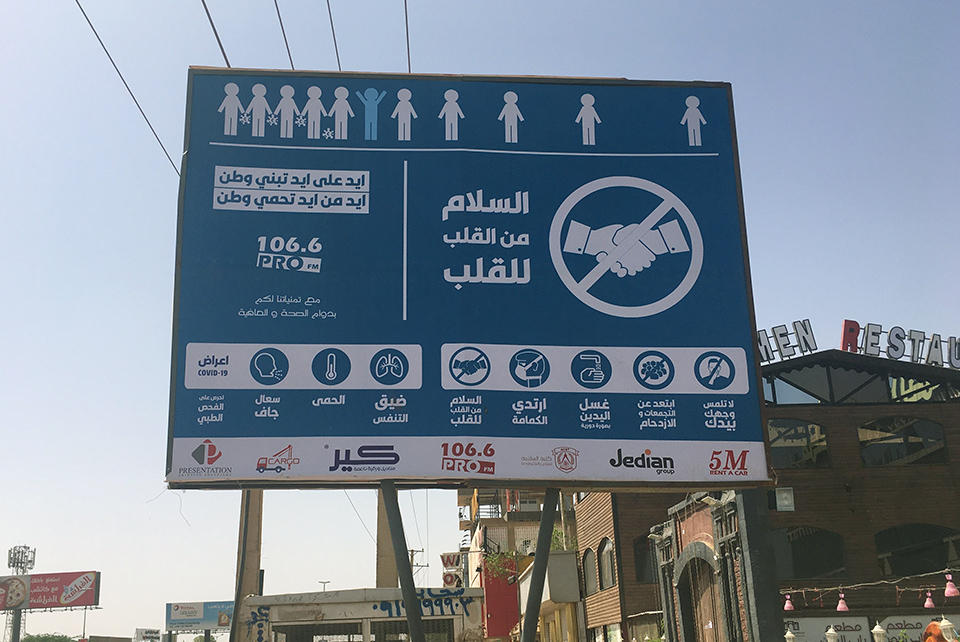
There are many signs all over the city which are promoting infection control. This sign says, “Hold hands to create our country, release hands to protect our country.”
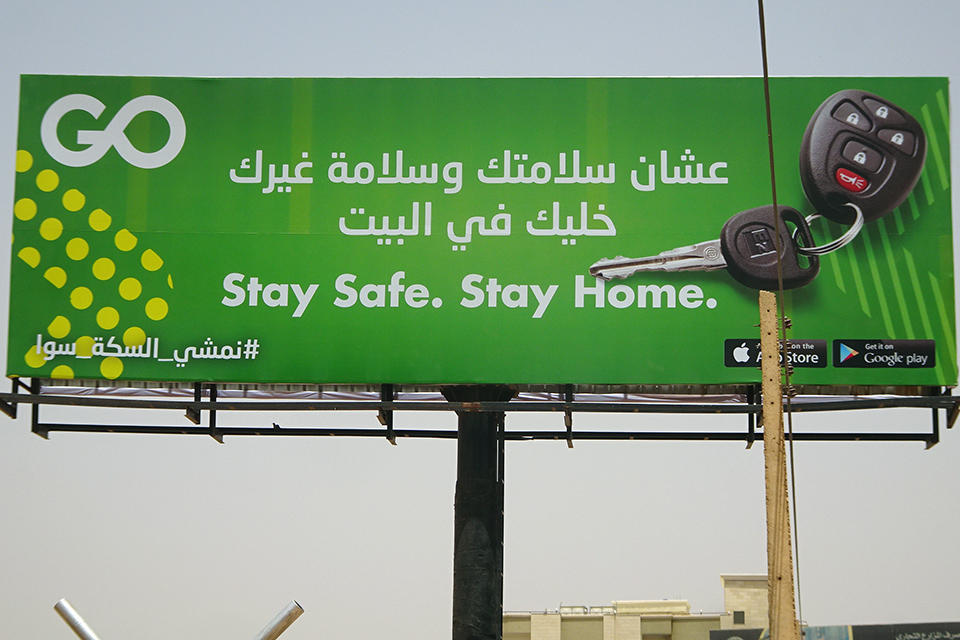
Another sign in the city. “Stay Safe. Stay Home.”
Phone calls
If you call someone, you will hear in the beginning a recorded announcement for about 30 seconds that encourages infection prevention. You will hear messages every time such as “Let’s wash our hands with soap for 20 seconds”, “Let’s refrain from shaking hands”, “Prevention is better than cure”, “We are stronger than Corona!” This is an effective way to spread the information to regions where access to the internet or television is limited, but where many people own mobile phones.
Art
During the demonstration for democratization last year, artists painted pictures on walls in the city, criticizing the government and emphasizing freedom, peace, and justice. They are playing an active role again during the emergency from COVID-19 (see photos).
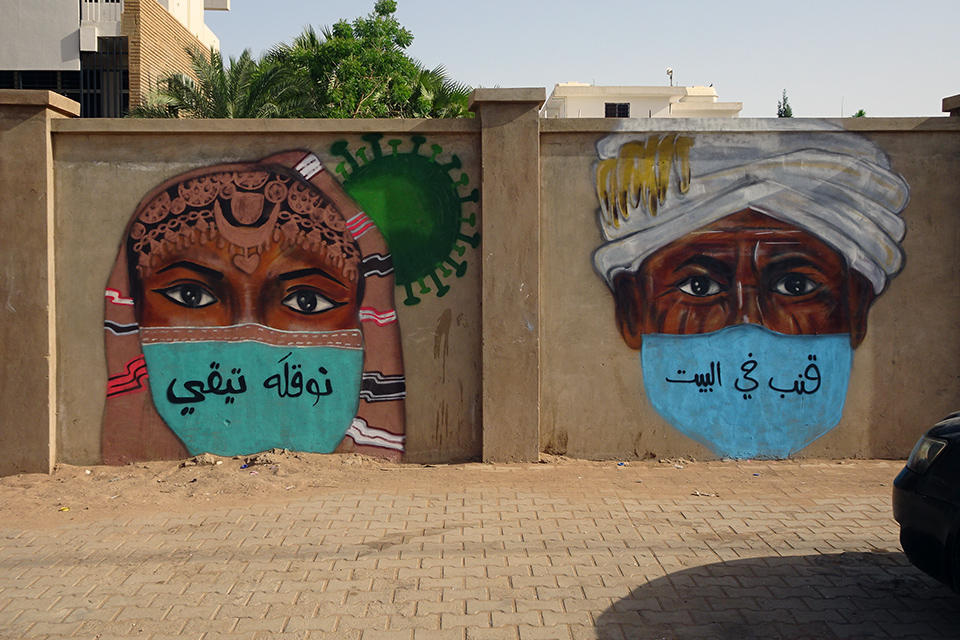
The words “Stay at home” are written in different languages on masks because Sudan consists of various ethnic groups.
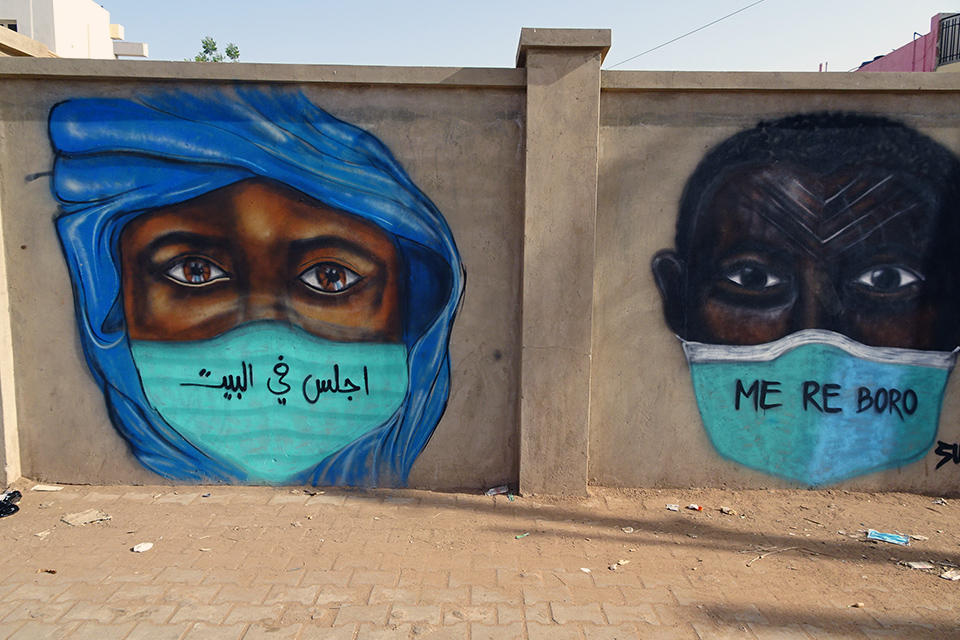
The person illustrated on the right is a South Sudanese. When a demonstration broke out last year, there were also many pictures that appealed for respect towards different ethnic groups and cultures.
Besides these, posters are put up in places where people gather, such as bakeries, restaurants, and buses. Employees wear masks and sanitize the hands of customers at the entrance, but I think no more than 5% of the civilians are wearing masks in the city. Also, I see people going out and secretly doing business even though currently there is a curfew after 1 pm. Moreover, there is a constant shortage of bread and fuel, so there is no social distancing in the long lines of people waiting.
Some people say that after the dictatorship collapsed last year, the security forces that cracked down on citizens were disbanded and there is now no system to regulate citizens.
Voices of the people
While the number of infected is fairly limited, there are quite a few people who regard this issue as something irrelevant to them by saying things such as, “The government is submitting a false report to the WHO to receive financial support” and “Corona won’t spread in Sudan because of the hot climate.” Here are the voices of some people in the city.
Yousri, a storekeeper
I am troubled that sales have decreased because of the shortened business hours. I was planning to get married during Eid after Ramadan (a holiday similar to the Japanese New Year), but I decided to postpone it because I didn’t have enough money.
Hassan, a clothing stallkeeper
Many students went back to their hometowns because the universities have closed, so customers have decreased. I could only sell 1 piece of T-shirt today. Ramadan is usually the peak season when we can expect high sales, but all I can do now is to sleep at home because we are not allowed to do business.
Khalid, a café clerk
The café where I am working is closed, so I can smoke Shisha at home and relax. I’m not sure if I will get paid by the café, but I’ve never had a holiday longer than three days in these four years. It’s difficult to imagine what it will be like to have a holiday for three weeks.
Walid, an apartment landlord
The government banned us to pray at mosques, but we continue to pray regardless of the ban. We, Sudanese, are not afraid of Corona. But I’m not accepting new residents. I don’t want anyone bringing Corona.
Mohammed, a medical student
Last year the university was closed because of the demo, and now it is closed again because of Corona. The university said that classes will be held online, but there is no sign of starting. If this situation continues, I want to study overseas.
Ali, who came from Syria to Sudan for his daughter’s wedding
I was planning to stay in Sudan for a week but have been trapped here for 2 months now. A nephew of mine passed away during this period… I want to go back to my beautiful hometown in Syria.
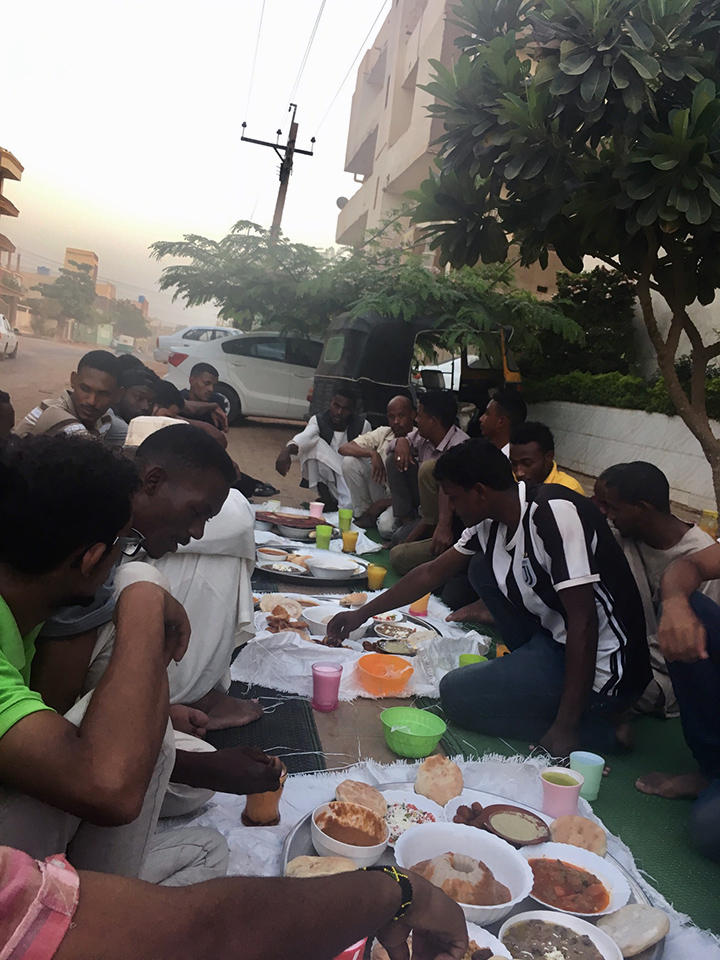
During Ramadan last year. It is a culture in Sudan to sit along the road and eat together during Iftar (a meal after fasting). This year’s Ramadan began from April 25th and there were people sitting along the side of the road and eating together as usual.
The next blog will be about the situation in our project site, Kaduqli, and our activities.
Share This: